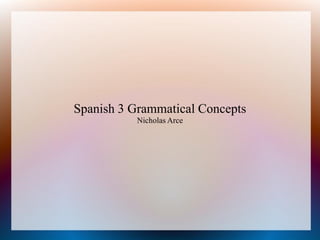
Spanish 3 Grammar Notebook Nicholas
- 1. Spanish 3 Grammatical Concepts Nicholas Arce
- 2. Table of Contents 1- Title 15- Comparatives and Superlatives 2- Table of Contents 16- Future Tense 3- Preterite Tense 17- Future Triggers 4- Preterite Triggers 18- Future Irregulars 5- Car, Gar, Zar 19- Transition Words 6- Spock 20- Por 7- Snake, Snakey 21- Para 8- Cucuracha 9- Imperfect Tense 10- Imperfect Triggers 11- Irregulars 12-Preterite vs. Imperfect 13- Ser vs. Estar 14- Verbs like Gustar
- 3. This verb form is used for completed actions in the past. Such as you ate yesterday, Regular Verb Forms comiste ayer, or I swam at 8, Nadé a las ocho. They have a é amos definitive start and end. -Ar aste - ó aron Preterite -Er/Ir í imos iste - ió ieron
- 4. Every verb tense has Triggers words which will help you identify which tense to use. For the preterite tense... Ante ayer El dia anterior El jueves pasado El otro dia UN! vez All these will help you identify the perterite tense
- 5. Car, Gar, Zar Most (if not all) verb forms have irregulars. The preterite has quite a few...the first being the car, gar, and zar verbs. For these verbs, take off the ending of the infintive, and for the YO form with verbs ending in car, gar, or zar, use the endings qué, gué, and cé respectively. buscar---busqué llegar---llegué empezar---empecé
- 6. Irregular conjugations for each Spock! grouping. No accents! Hacer hice, hicimos, hiciste, hizo, hicieron Dar Ir Ver Dar/Ver Ser -i,-imos,-iste,-io,-ieron Hacer Ir/Ser fui, fuimos, fuiste, fue, fueron
- 7. Only the bottom of the Snake....Snakey chart....(3rd person) has an irregular conjugation where the vowel changes to a y. Leer Oir leyó oyó leyeron oyeron
- 8. Cucurachas! andar anduv- estar estuv- These verbs all have the same endings: e, imos, tener tuv- iste, o, ieron. caber cup- haber hub- Anduve, anduvimos, anduviste, anduvo, poder pud- anduvieron poner pus- saber sup- hacer hic- ***** for those, the 3rd person plural drops the 'I' in the conjugation. For example. Trajeron instead querer quis- of trajieron.... venir vin- *decir dij- *producir produj- *traer traj-
- 9. Imperfect Used to describe past actions The endings are.... that don't have a specific beginning or ending. They -Ar aba abámos have an imperfect time. They abas - describe habitual past actions, or uncompleted actions. Also aba aban vague refrences would use the imperfect.... cuando ERA -Er/Ir niño... ía íamos ías - ía ían
- 10. A veces A menudo De vez en cuando Triggers Mientras Muchas veces Los lunes Denotes the imperfect tense!!!! Cada dia Frequentemente siempre
- 11. Imperfect Irregulars Ir Ser Ver iba era veía ibas eras veías iba era veía íbamos éramos veíamos iban eran veían Only 3, enough said?
- 12. Preterite vs. Imperfect We have two ways we could possibly express past actions, with the preterite and imperfect tenses. So, which one should we use? Well, the preterite, as I Nadaste a las dies (Pret.) said before, is like a snapshot, a definite time. Imperfect is like Nadaba de vez en cuando (imp.) a movie, it keeps moving. If that isn't confusing enough, they can both be used in the same sentence. But luckily, the Cuando dormía, mi perro comió imperfect shows the una hamburguesa con queso. background information such as time, weather, and location, while the preterite shows the specific events.
- 13. Ser vs. Estar Ser Estar D- descriptions H- health O- occupations E- emotions C- characteristic L- location T- time P- physical characteristics O- origin ING- for verbs in English ending in -ing you need estar + R- relationships verb + ando/iendo P- possesion E- events D- dates
- 14. Verbs like Gustar Some verbs work like gustar Personal pronoun + gusta/an + noun me encantan los zapatos me fascina comer no me importa aburrir, faltar, importar, interesar, molestar, quedar, caer, doler, disgustar, preocupar, sorprender, apetecer
- 15. Comparatives and Superlatives Comparatives Superlatives Mas ____ que ____ el mas ___ de ____ Menos ____ que ____ el menos ___ de ____ Nuestra casa es mas grande que su Nuestra casa es el mas grande de casa todos en el mundo *Irregular adjectives *OTRO! Bueno- mejor Tan___ como *Numbers! Malo- peor Mas de or menos de as ___ as Viejo- mayor Tanto ___como Joven- menor as much/many as
- 16. Future Tense All verbs end the same way! Infintive + ending é emos ás - Hablaré miercoles. á án
- 17. Triggers When you see these, Mañana you know the event will El lunes be happening sometime in the future! Despues de mañana El proximo dia
- 18. Irregulars! Caber cabr Poner pondr Decir dir Same endings, but the Haber habr stem changes! Salir saldr Hacer har Poder podr Tener tendr Querer querr Valer valdr Sabe sabr Venir vendr
- 19. Transition Words These words will spice up your • Aunque- even though sentences and • Mientras- while provide you with ways of saying • A pasar de- in spite of more things. • Por lo tanto- therefore • Sin embargo/no obstante- nevertheless
- 20. Por For By means of Passing through PORtal General, not specific PORtugal How long PORever The cause of something PORpuse An exhange imPORt/exPORt Doing something in I am POR, pay for me place of someone By means of moving transPORtation
- 21. Para For In order to For whom something is Suprise PARAtay done Destination PARAguay The purpose for whom PARAsites something is done Opinions PARAdon me, but... Contrast and compare comPARAson deadline PARAmedic